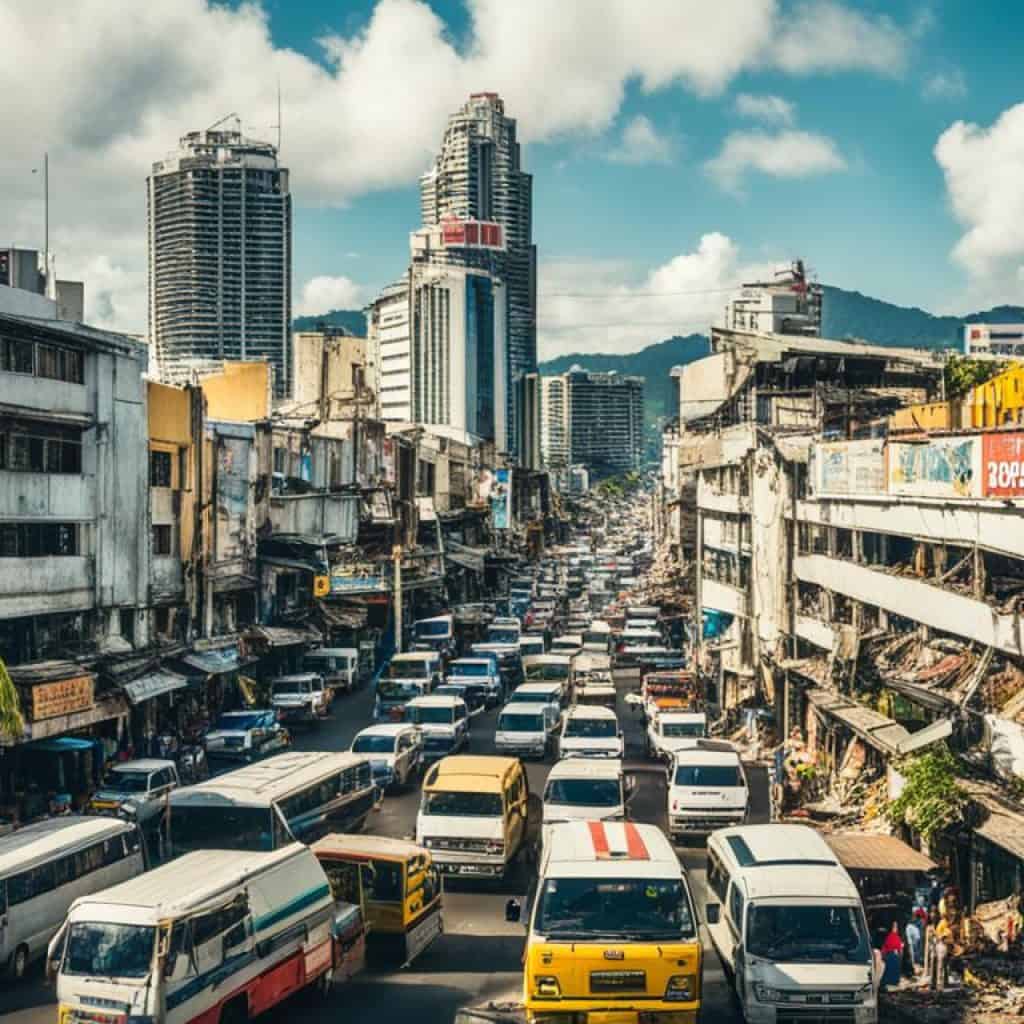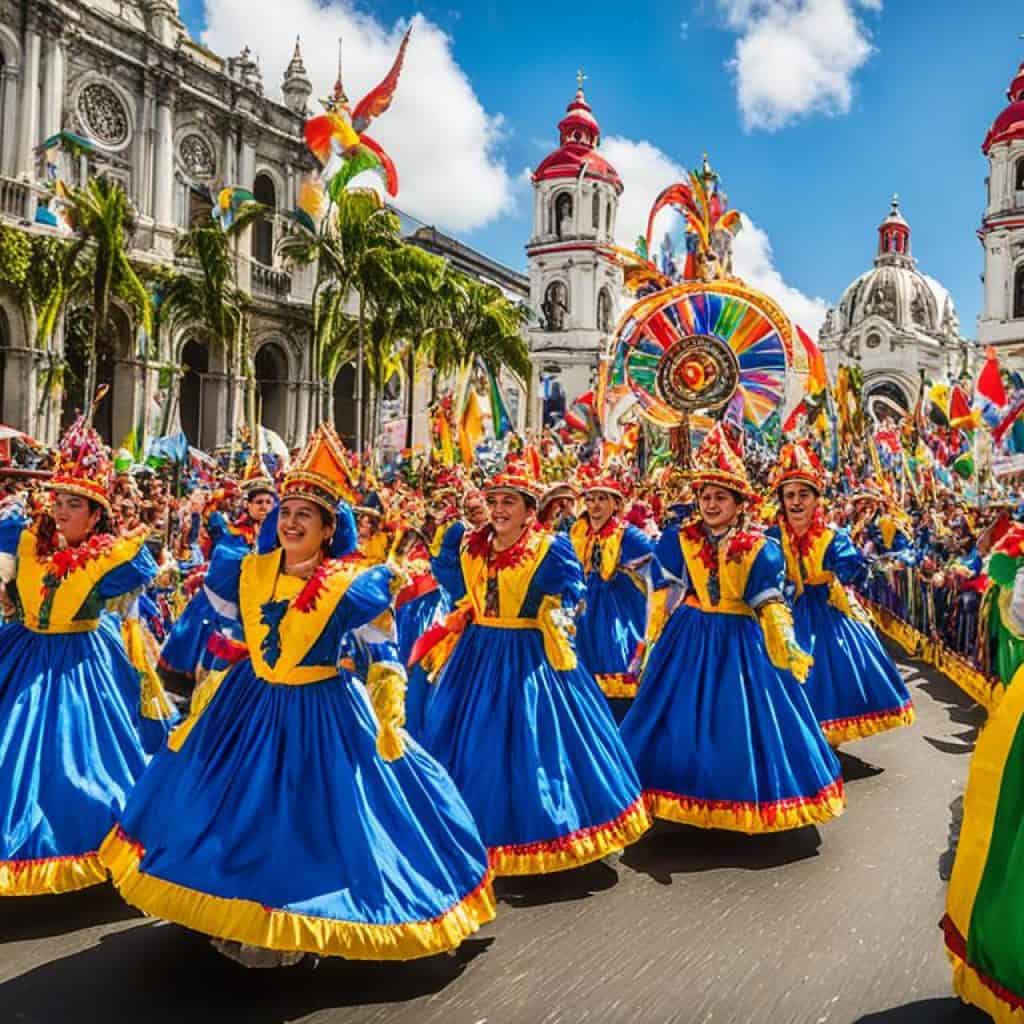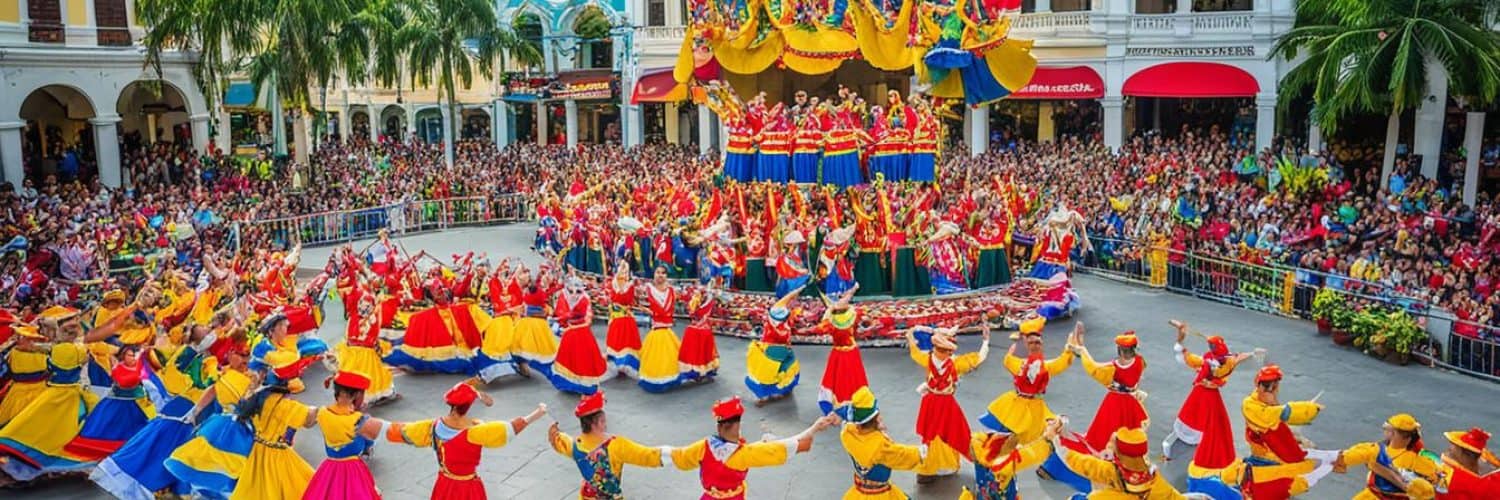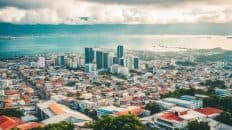Have you ever wondered how a single day can hold so much historical and cultural significance? How a municipality that once was transformed into a thriving chartered city? This is the essence of Cebu Province Charter Day, a vibrant celebration that commemorates the remarkable journey of Cebu from its humble beginnings to its present glory.
Every year, on February 24, the people of Cebu come together to honor the day when their beloved province achieved its cityhood status in 1937. It is a time of joy, pride, and reflection, as they pay tribute to the rich history and cultural heritage that make Cebu Province truly special.
During this auspicious occasion, Cebu Province comes alive with festivities and activities that showcase its vibrant culture. From colorful parades to captivating performances, the streets are filled with the infectious energy and joy of the celebration. It is a time for Cebuanos to come together, to appreciate their shared heritage, and to demonstrate their unwavering love for their beloved province.
But Cebu Province Charter Day is more than just a day of revelry. It serves as a reminder of the struggles and achievements that have shaped the province’s identity. It celebrates the resilience of the Cebuano people and their ability to overcome challenges, inspiring future generations to continue building a brighter future.
Join us as we delve into the history, significance, and festivities of Cebu Province Charter Day. Discover the remarkable journey of Cebu and immerse yourself in the cultural tapestry that makes this celebration truly unique.
Key Takeaways:
- Cebu Province Charter Day commemorates the transformation of Cebu from a municipality to a chartered city in 1937.
- The celebration is a vibrant showcase of Cebu’s rich history and cultural heritage.
- It serves as a time for Cebuanos to come together, appreciate their shared heritage, and demonstrate their love for their province.
- Cebu Province Charter Day is a reminder of the struggles and achievements that have shaped the province’s identity.
- The celebration inspires future generations to continue building a brighter future for Cebu Province.
History of Cebu City
The history of Cebu City can be traced back to the arrival of Ferdinand Magellan in 1521. At that time, the area was ruled by Rajah Humabon. However, after Magellan’s death in the Battle of Mactan, the Spanish colonialists gained control of the island. Cebu City then became the first capital city and the oldest city in the Philippines.
Throughout its history, Cebu City has played a crucial role in trade and commerce due to its strategic location in the Visayas region. It has been a center of economic activity and development, attracting merchants and traders from various parts of the world.
Over the years, Cebu City has witnessed significant progress and growth in terms of infrastructure, population, and urbanization. Today, it stands as a bustling metropolis, embodying a fascinating blend of modernity and cultural heritage.
Spanish Influence and Development
Under Spanish rule, Cebu City flourished as an important trading port. The Spanish colonialists introduced Catholicism and built significant landmarks, including the Basilica Minore del Sto. Niño and Fort San Pedro, which still stand today.
The Spanish left an indelible mark on the city’s architecture, culture, and traditions, which are evident in the colorful festivals, such as the Sinulog Festival, celebrated annually in Cebu City.
American Period and Modernization
After the Spanish-American War, Cebu City came under American rule. The American occupation brought further developments to the city, including the establishment of the Cebu Normal School (now known as Cebu Normal University) and improvements in infrastructure and public services.
As the years went by, Cebu City continued to grow and modernize. The city became a hub for education, commerce, and tourism, attracting visitors and investors alike.
“Cebu City’s rich history and cultural heritage are testaments to its resilience and vibrant spirit. The city’s journey from its humble beginnings to its present-day glory is a captivating tale worth exploring.”
Present and Future Prospects
In recent years, Cebu City has experienced rapid urbanization and development. The local government has been proactive in implementing initiatives to enhance public services, promote sustainable tourism, and further improve the quality of life for its residents.
With its vibrant economy, commercial centers, and stunning natural attractions, Cebu City continues to attract both domestic and international tourists. Its future prospects remain promising as it endeavors to establish itself as a global city while preserving its rich cultural heritage.
Vicente Rama: The Father of Cebu City Charter
Vicente Rama, a prominent Filipino politician, holds a significant place in the history of Cebu City. Known as the Father of Cebu City Charter, Rama played a pivotal role in the city’s transformation. Through his relentless efforts and political acumen, Rama introduced the legislation that led to the cityhood of Cebu. His vision and dedication to the development of Cebu City are celebrated and honored during the annual Charter Day festivities.
“The progress and prosperity of Cebu City owe much to the remarkable contributions of Vicente Rama. His determination and leadership paved the way for the city’s advancement as a chartered city, solidifying its place in the Philippines’ history.” – Mayor’s Office, Cebu City
Vicente Rama’s political career spanned both local and national levels. As an assemblyman and senator, he advocated for the rights and welfare of the Cebuanos. However, it was his authorship of the bill that converted the municipality of Cebu into a chartered city that earned him the title of “Father of Cebu City Charter.”
The charter granted Cebu City the autonomy and authority to govern itself, empowering local officials to make decisions that directly impacted the city’s development. Rama’s foresight and determination were instrumental in shaping the city’s future and setting the stage for its progress.
Legacy and Recognition
Vicente Rama’s legacy as the Father of Cebu City Charter lives on through the thriving metropolis we see today. His contributions continue to impact the lives of Cebuanos, as the city experiences economic growth, infrastructure development, and improved quality of life for its residents.
During the annual Charter Day celebrations, Cebu City pays homage to Vicente Rama’s visionary leadership and indelible mark on the city’s history. The festivities serve as a reminder of the achievements and progress Cebu City has made under Rama’s influence.
Vicente Rama as an Inspiration
Vicente Rama’s story serves as an inspiration for future generations of leaders. His dedication, perseverance, and love for his city propelled him to be a catalyst for change and progress. His legacy encourages Cebuanos to embrace their roles as stewards of the city’s development, fostering a sense of civic duty and pride.
The spirit of Vicente Rama lives on, driving the people of Cebu City to work towards the city’s continuous growth, development, and the preservation of its rich cultural heritage.
Cebu City Charter Day Activities
During the celebration of Cebu City Charter Day, the city comes alive with a variety of vibrant activities and events that showcase its rich culture and heritage. From talent contests to cultural performances, there is something for everyone to enjoy and participate in. These activities are carefully organized by the city government to commemorate the historic cityhood of Cebu and celebrate the remarkable progress and achievements of the city.
One of the highlights of the Charter Day festivities is the talent contest, where local artists and performers showcase their skills in various disciplines such as singing, dancing, and acting. This competition is not only a platform for aspiring talents to shine but also a chance for the community to bond and appreciate the artistic diversity of Cebu City.
Another integral part of the celebration is the cultural performances that pay homage to the city’s traditions and customs. These performances feature traditional music, dances, and storytelling, allowing visitors to immerse themselves in the vibrant cultural heritage of Cebu City. The colorful costumes, rhythmic beats, and captivating narratives create a truly enchanting experience for all.
Additionally, Cebu City Charter Day celebrations include business fairs that provide opportunities for local entrepreneurs to showcase their products and services. These fairs promote economic growth and prosperity, highlighting the city’s thriving business community. Visitors can explore a wide range of goods, from local handicrafts to delicious local delicacies, supporting the local economy and experiencing the vibrant entrepreneurial spirit of Cebu City.
Religious ceremonies also play a significant role during the Charter Day festivities, as Cebu City has a deep-rooted religious heritage. These ceremonies offer moments of reflection and thanksgiving, emphasizing the importance of faith in the lives of the people of Cebu. Visitors can witness the devotion and spiritual fervor that has shaped the city’s identity throughout history.
Overall, the Cebu City Charter Day activities provide a perfect platform for Cebuanos and visitors to come together and celebrate the city’s remarkable journey. It is a time to reflect on the past, appreciate the present, and look forward to an even brighter future. Whether you’re interested in the arts, culture, business, or spirituality, Cebu City Charter Day has something for everyone to enjoy and remember for years to come.
| Activities | Date | Location |
|---|---|---|
| Talent Contest | February 24 | Cebu City Hall |
| Cultural Performances | February 24 – 26 | City Cultural Center |
| Business Fair | February 24 – 27 | Cebu Trade Hall |
| Religious Ceremonies | February 24 | Various Churches |
Issues and Challenges of Cebu City
Despite the significant progress that Cebu City has made, there are several pressing issues and challenges that require attention in order to ensure its ongoing development and growth.
Traffic Congestion
One of the major challenges faced by Cebu City is traffic congestion. As the city continues to expand and attract more businesses and residents, the roads have become increasingly congested, leading to longer commuting times and reduced efficiency. Efforts are being made to improve the transportation infrastructure and implement smarter traffic management systems to alleviate this issue.
Infrastructure Development
Another key challenge is the need for better infrastructure development. As the city grows, there is a demand for improved roads, bridges, and public transportation networks. Investing in infrastructure is crucial for attracting investments, enhancing connectivity, and ensuring the smooth operation of businesses and services.
Faster Internet Connectivity
In today’s digital age, fast and reliable internet connectivity is essential for businesses, education, and everyday life. Cebu City faces the challenge of improving its internet infrastructure to provide faster and more accessible internet services to its residents and businesses. This is crucial for promoting innovation, attracting tech companies, and enhancing digital connectivity.
Housing Problems
Cebu City experiences housing problems due to its rapid urbanization and population growth. The demand for affordable housing exceeds the supply, leading to high costs and inadequate living conditions for some residents. Addressing this challenge requires the implementation of sustainable housing initiatives and collaborations between the government and private sector.
Fight Against Illegal Drugs
Similar to many urban areas, Cebu City faces the challenge of combating illegal drug activities. Law enforcement agencies and local authorities work tirelessly to address this issue and create a safer environment for the community. It requires a multi-faceted approach involving education, prevention, rehabilitation, and enforcement to effectively tackle the problem.

These issues and challenges are not insurmountable, and Cebu City’s officials and stakeholders are committed to finding solutions. By addressing these challenges and fostering sustainable development, Cebu City can continue to flourish, improve the quality of life for its residents, and remain a vibrant and attractive city for both locals and tourists.
Economic Significance of Cebu City
Cebu City, located in the Visayas region of the Philippines, is a vibrant economic hub with a thriving business landscape. The city’s favorable environment for commerce and entrepreneurship has contributed to its prosperous economy and continuous growth. Various sectors, including real estate, retail, tourism, and information technology-business process management (IT-BPM), play a significant role in driving Cebu City’s economic development.
Cebu City offers numerous opportunities for businesses to flourish. The real estate industry, for instance, has experienced remarkable growth with the development of residential, commercial, and industrial properties. The city’s strategic location and robust infrastructure make it an attractive investment destination for both domestic and foreign investors.
“Cebu City’s economic growth is driven by a diverse range of sectors, such as retail, tourism, and IT-BPM. These industries provide employment opportunities and contribute to the city’s overall prosperity.”
The retail sector in Cebu City is thriving, with numerous shopping centers, malls, and markets catering to the city’s growing consumer base. From local brands to international retailers, the retail industry in Cebu City offers a wide array of goods and services, attracting shoppers from near and far.
Tourism is another key contributor to Cebu City’s economic success. The city is known for its stunning natural beauty, pristine beaches, and rich cultural heritage. Visitors flock to Cebu City to explore its historical landmarks, partake in vibrant festivals, and indulge in its culinary delights. The tourism industry not only generates revenue but also creates employment opportunities for the local population.
“Cebu City’s strong economic performance can be attributed to its dynamic business landscape, which attracts entrepreneurs and investors from various sectors.”
The information technology-business process management (IT-BPM) sector has also played a significant role in Cebu City’s economic growth. The city has become a preferred outsourcing destination, offering high-quality services in fields such as call centers, software development, and digital marketing. The presence of global companies in the IT-BPM industry has not only created job opportunities but has also positioned Cebu City as a knowledge hub in the region.
Overall, Cebu City’s economic significance stems from its conducive business environment, diverse sectors, and strategic location. The city continues to attract businesses, stimulate economic activity, and contribute to the prosperity of the Visayas region and the Philippines as a whole.
Recognition and Achievements of Cebu City
Throughout its rich history and prosperous journey, Cebu City has garnered well-deserved recognition and achieved remarkable milestones. Its continuous growth and development have positioned it among the top richest cities in the Philippines, as highlighted in reports by the Commission on Audit.
At the heart of Cebu City’s success lies its rich history and vibrant cultural heritage. The city’s historical significance as the oldest city in the Philippines, coupled with its pivotal role in trade and commerce, has contributed to its positive reputation and economic prosperity. Cebu City has emerged as a symbol of progress and opportunity.
The city’s recognition extends beyond its economic achievements. Cebu City has preserved its cultural heritage through its festivals, such as the renowned Sinulog Festival, which showcases the vibrant traditions and customs of the Cebuanos. This cultural richness has not only captured the attention of locals but also attracted tourists from around the world.
“Cebu City’s recognition is a testament to the collective efforts and resilience of its people. It stands as a shining example of progress, culture, and economic growth in the Philippines.”
Furthermore, Cebu City’s commitment to innovation and development has gained appreciation in various sectors. The city’s thriving information technology-business process management (IT-BPM) industry has placed it at the forefront of technological advancement in the region, attracting investments and creating numerous job opportunities for its residents.
In conclusion, Cebu City’s recognition and achievements are a product of its rich history, cultural heritage, and unwavering determination to progress. As the city continues to thrive, it remains an inspiration to other cities in the Philippines and a beacon of success for all.
Cebu Province Charter Day 2020 Celebration
The Cebu Province Charter Day celebration in 2020 was a weeklong event packed with various activities and programs that aimed to engage the community and highlight the achievements and potential of Cebu Province. From livelihood skills training to heritage walks, exhibitions, contests, and even medical services, the celebration embraced the spirit of festivity and community involvement.
The program kicked off with a series of informative workshops and skills training sessions aimed at empowering residents of Cebu Province. Topics covered a wide range of subjects, including entrepreneurship, sustainability, and innovation.
Visitors and locals alike had the opportunity to immerse themselves in Cebu’s rich cultural heritage through heritage walks. These guided tours took participants through historical landmarks and significant sites, providing valuable insights into the province’s history and legacy.
“The Cebu Province Charter Day celebration in 2020 showcased the diversity and talent of the local community, fostering a sense of pride and unity.”
Exhibitions featuring local arts, crafts, and products were also held, providing a platform for local artisans, entrepreneurs, and businesses to showcase their work. This not only supported the local economy but also offered visitors a chance to experience the unique craftsmanship and creativity of Cebu Province.
The celebration was not short of excitement, as contests and competitions were held to bring out the spirit of friendly rivalry. From sports tournaments to talent showcases, participants and spectators were entertained throughout the week.
Recognizing the importance of healthcare in the community, the celebration included medical services such as health check-ups and consultations. This initiative aimed to promote overall wellness and provide access to essential healthcare services for residents.
Overall, the Cebu Province Charter Day 2020 Celebration was a resounding success, showcasing the province’s vibrant culture, unity, and potential. The event brought together residents, visitors, and businesses, fostering a sense of pride and solidarity.
| Activities | Date | Venue |
|---|---|---|
| Livelihood skills training | February 24-26 | Cebu City Convention Center |
| Heritage walks | February 25-27 | Various locations |
| Exhibitions | February 24-March 1 | Cebu Provincial Capitol |
| Contests and competitions | February 26-28 | Various venues |
| Medical services | February 27-March 1 | Cebu Provincial Hospital |
Cebu City’s Impact on Tourism
Cebu City, with its rich cultural heritage and natural beauty, has become a sought-after destination for tourists from around the world. This vibrant city offers a plethora of attractions that cater to various interests, making it a popular choice for travelers seeking an unforgettable experience.
One of the main draws of Cebu City is its historical landmarks that showcase the city’s rich history and heritage. Visitors can explore iconic sites such as the Basilica Minore del Sto. Niño, which houses the oldest religious relic in the Philippines, and Fort San Pedro, a well-preserved Spanish fortress that offers a glimpse into the city’s colonial past. These landmarks not only provide insights into Cebu’s history but also serve as cultural treasures that evoke a sense of awe and admiration.
Another highlight of Cebu City is its pristine beaches that offer a tropical paradise for beach lovers. From the popular Mactan Island with its luxurious resorts and crystal-clear waters to the picturesque town of Moalboal known for its vibrant marine life and diving spots, beach enthusiasts are spoiled for choice. Whether you want to relax on powdery white sands or engage in thrilling water activities, Cebu City’s beaches offer something for everyone.
“Cebu City’s rich cultural heritage and natural beauty attract visitors from around the world.”
In addition to its historical landmarks and stunning beaches, Cebu City hosts vibrant festivals throughout the year that celebrate the city’s culture and traditions. The world-renowned Sinulog Festival is a grand spectacle of colors, music, and dance, paying homage to the city’s conversion to Christianity. The festival attracts both locals and tourists who want to experience the energetic street performances and immerse themselves in the local culture.
It is worth noting that tourism plays a significant role in the economy of Cebu City. The influx of visitors contributes to the growth of various sectors, such as hospitality, transportation, and retail. Moreover, tourism provides employment opportunities for the local population, supporting livelihoods and driving economic development in the city.
As Cebu City continues to enhance its tourism offerings, it asserts itself as a premier destination that captivates the hearts of travelers. With its captivating history, breathtaking beaches, and vibrant festivals, it is no wonder that Cebu City remains a top choice for those seeking an enriching and memorable travel experience.
Importance of Cebu City Charter Day for Cebuanos
Cebu City Charter Day is a highly significant event for the people of Cebu. It serves as a momentous occasion to celebrate and honor the rich history, vibrant culture, and remarkable achievements of their beloved city. This annual celebration is not just a mere commemoration; it is a testament to the Cebuanos’ unyielding pride and deep-rooted connection to their heritage.
With each passing Charter Day, Cebuanos come together to reflect on their shared identity and the progress they have made as a community. It is a time to pay homage to the pioneers and visionaries who have shaped and transformed Cebu City into what it is today.
During the Charter Day festivities, Cebuanos showcase their cultural pride through various activities that highlight the city’s artistic endeavors, traditional dances, music, and culinary delights. It is an opportunity for locals and visitors alike to immerse themselves in the vibrant tapestry of Cebuano culture and experience firsthand the warmth and hospitality that define this remarkable city.
The significance of Cebu City Charter Day extends beyond the boundaries of the city itself. It serves as a source of inspiration and admiration for other cities and communities throughout the Philippines. Cebu City’s rich history and cultural heritage have played a vital role in shaping the nation’s identity, making it a point of pride for Filipinos all over the country.
“Cebu City Charter Day is a time for Cebuanos to come together and celebrate their shared heritage, cultural diversity, and the remarkable achievements of their city. It instills a sense of pride and unity among the people, fostering a deeper appreciation for the contributions of past and present generations.”
Over the years, Cebu City Charter Day has become more than just a local celebration; it has evolved into an opportunity for Cebuanos to showcase their dynamism, resilience, and unwavering spirit. It is a reminder of the immense potential and bright future that lies ahead for Cebu City and its residents.
As Cebuanos gather to commemorate their Charter Day, they are reminded of the challenges faced and overcome, the milestones achieved, and the continuous progress that lies ahead. It is a time to reaffirm their commitment to the growth and development of their city and to unite in their collective efforts to build an even better future.
Key Takeaways:
- Cebu City Charter Day is a momentous celebration that honors the history, culture, and achievements of Cebu City.
- The event instills a sense of pride and unity among Cebuanos, fostering a deeper appreciation for their shared heritage.
- During the festivities, Cebuanos showcase their cultural pride through various activities that highlight the city’s arts, traditions, and cuisine.
- Cebu City Charter Day signifies the city’s contributions to the nation’s identity and serves as a source of inspiration for other communities in the Philippines.
- The celebration is a reminder of the immense potential and bright future that lies ahead for Cebu City and its residents.
Cebu City’s Future Development
In line with its vision for progress and growth, Cebu City is actively prioritizing its future development. The city is committed to addressing crucial infrastructure needs and implementing strategic plans to enhance the quality of life for its residents and promote sustainable development. Cebu City’s future development will pave the way for a brighter, more vibrant future.
The government is taking significant steps to improve the city’s infrastructure, focusing on areas such as road networks, transportation systems, and public utilities. Cebu City recognizes that well-planned and efficient infrastructure is vital to support its growing population and foster economic growth.
Collaboration between the government and private sectors plays a key role in ensuring effective development strategies. The city is actively engaging with stakeholders to leverage their expertise and resources to drive progress and innovation. By forging strong partnerships, Cebu City can maximize its potential and achieve its development goals more efficiently.
“Cebu City’s future development is centered around the well-being and prosperity of its residents. With carefully planned initiatives, we aim to create a city that offers an exceptional quality of life, robust economic opportunities, and sustainable growth.”
– Mayor of Cebu City
Infrastructure Development
Cebu City’s future development necessitates substantial investment in infrastructure. The city is prioritizing the construction and improvement of roads and highways to alleviate traffic congestion and facilitate smoother transportation. Additionally, plans are underway to enhance public transportation systems, such as expanding the existing metro lines and implementing innovative mobility solutions.
The city is also focused on upgrading utilities to ensure efficient and reliable services for its residents. From modernizing water supply and sanitation systems to improving waste management processes, Cebu City aims to create a sustainable and environmentally friendly urban environment.
| Infrastructure Initiatives | Timeline |
|---|---|
| Expansion and improvement of road networks | Ongoing |
| Enhancement of public transportation systems | 2022-2025 |
| Modernization of water supply and sanitation systems | 2023-2026 |
| Innovative waste management programs | 2024-2027 |
Note: Table data and timeline are for illustrative purposes only, based on projected plans. The actual timelines and initiatives may vary based on governmental decisions and budget allocations.
By investing in infrastructure development, Cebu City aims to provide its residents with a well-connected and sustainable urban environment. These improvements will not only enhance the city’s livability but also attract more businesses, investors, and tourists, contributing to its overall economic growth and prosperity.
As Cebu City continues on its path of future development, it remains committed to preserving its rich heritage and cultural identity. The city’s growth will be a testament to its resilience, adaptability, and commitment to creating a vibrant and inclusive community for residents and visitors alike.
Tourist Attractions in Cebu City
Cebu City, a vibrant destination in the Philippines, offers a multitude of attractions that cater to every type of traveler. From historical landmarks to scenic beaches and colorful festivals, there is something for everyone to enjoy.
Historical Landmarks
Immerse yourself in the rich history of Cebu City by visiting its famous landmarks. The Basilica Minore del Sto. Niño, a centuries-old church, is a popular pilgrimage site and an architectural marvel. Explore the Fort San Pedro, a Spanish-era fortress that played a significant role in protecting the city. Don’t miss out on Magellan’s Cross, a historical symbol marking the arrival of Christianity in the Philippines.
Beautiful Beaches
Cebu City is surrounded by breathtaking beaches that offer sun, sand, and surf. Just a short distance away is the idyllic Mactan Island, known for its pristine white sand beaches and world-class resorts. Dive enthusiasts will want to head to Moalboal, famous for its vibrant marine life and stunning coral reefs.
Vibrant Festivals
Experience the joy and energy of Cebu City’s vibrant festivals. The Sinulog Festival is an annual celebration showcasing traditional dances, colorful costumes, and lively street parades. Be mesmerized by the rhythmic beats of drums and the devotion of the locals as they pay homage to the Santo Niño, the patron saint of Cebu.
| Attraction | Description |
|---|---|
| Basilica Minore del Sto. Niño | A historical church and pilgrimage site dating back to the 16th century. |
| Fort San Pedro | A Spanish-era fortress that served as a stronghold during the colonial period. |
| Magellan’s Cross | A historical landmark marking the arrival of Christianity in the Philippines. |
| Mactan Island | A picturesque island known for its beautiful beaches and luxury resorts. |
| Moalboal | A popular diving destination with vibrant marine life and stunning coral reefs. |
| Sinulog Festival | An annual festival featuring colorful street parades and traditional dances. |
Importance of Cebu City Charter Day for Philippines
Cebu City Charter Day is not only a significant celebration for the people of Cebu but also holds great importance for the entire Philippines. As the oldest city and a bustling center of commerce in the country, Cebu City’s progress and achievements symbolize the nation’s development and growth. The celebration of Charter Day serves as a national platform to showcase the Philippines’ rich history, diverse cultural heritage, and the spirit of unity.
Cebu City, with its historical significance and vibrant cultural tapestry, represents the essence of the Philippines. The city’s journey from a municipality to a chartered city is a testament to its resilience, vision, and the indomitable spirit of its people. The annual celebration of Cebu City Charter Day not only highlights the milestones and progress achieved by the city but also provides an opportunity to reflect on and celebrate the shared heritage and collective aspirations of all Filipinos.
Through cultural events, performances, and exhibitions, Charter Day celebrations bring people from different regions of the Philippines together. It creates an environment where the diverse cultures, traditions, and artistic expressions of the country can be celebrated and appreciated. This national celebration fosters a sense of pride, patriotism, and unity among Filipinos, reinforcing the values that define the nation.
Moreover, Cebu City’s economic significance and contributions play a vital role in shaping the growth and prosperity of the entire country. As a center for trade, commerce, and tourism, Cebu City serves as a gateway to the Philippines. Its robust economy, fueled by various industries such as real estate, retail, tourism, and information technology-business process management (IT-BPM), attracts domestic and international businesses, generating employment opportunities and contributing to the overall economic development of the Philippines.
The commemoration of Cebu City Charter Day serves as a platform to recognize and appreciate the achievements, advancements, and potential of the Philippines as a nation. It celebrates the city’s rich history, vibrant culture, and economic prowess while highlighting the unity and diversity that define the Filipino identity. Cebu City Charter Day is a national celebration that honors the past, embraces the present, and inspires a brighter future for the Philippines.

| Key Highlights | Significance |
|---|---|
| Oldest city in the Philippines | Reflects the country’s rich history |
| Center of commerce and trade | Symbolizes the nation’s economic growth |
| Celebrates the diversity of Filipino culture | Emphasizes unity and shared heritage |
| Attracts businesses and drives economic development | Contributes to the growth of the entire country |
Conclusion
Cebu Province Charter Day is a vibrant cultural celebration that brings together the community to honor the city’s history, achievements, and culture. It serves as a reminder of Cebu’s ongoing development and growth, showcasing its progress and potential. The event fosters a sense of pride and unity among Cebuanos, highlighting the significance of this special day.
Throughout the celebration, various activities and programs create an atmosphere of joy and togetherness. From talent contests to cultural performances, business fairs to religious ceremonies, there is something for everyone to enjoy and participate in. The Charter Day festivities reflect the city’s dynamic spirit and its dedication to preserving its rich heritage.
Cebu City Charter Day is not only a celebration but also a time to reflect on the challenges and priorities for the future. As the city continues to grow, addressing issues such as traffic congestion, infrastructure, and connectivity becomes crucial. It is a collective effort to shape the city’s path towards sustainable development and ensure a better quality of life for its residents.


















Add comment